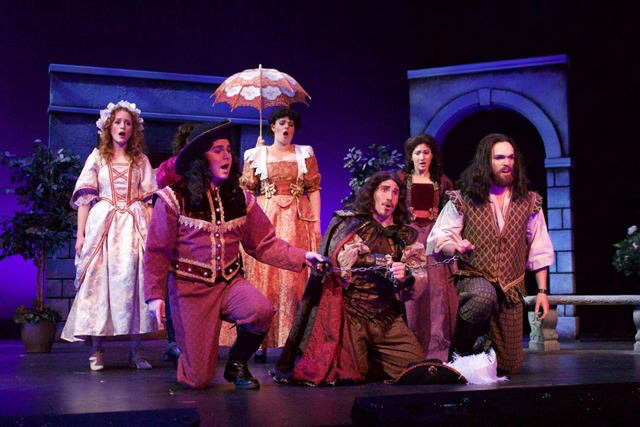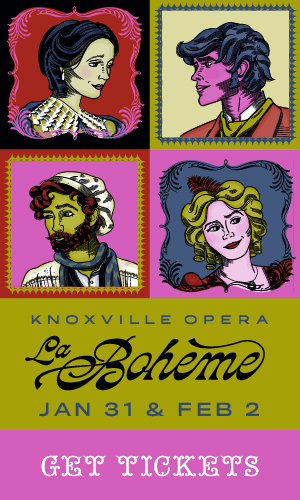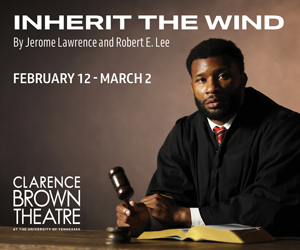There seems to be an infinite number of valid directions an opera company can take with Mozart’s Don Giovanni—serious, mock-serious, abstract, psychological, modern, period…and on and on. However, Mozart and his librettist, Lorenzo Da Ponte, billed their operatic take on the legend of Don Juan as a dramma giocoso, a mix of the comic and the serious. Mozart’s own catalogue entry classified it as opera buffa, a term used to describe Italian comic opera. Comedy is certainly the direction that James Marvel and the University of Tennessee Opera Theatre have taken with their Don Giovanni, seen in four performances last weekend at the Bijou Theatre. This high energy approach that taps the boisterous potential of the current batch of UTOT singers worked sensationally in almost every conceivable way.
Marvel cleverly used the overture and its transition from the ominous-sounding opening chords to a light-hearted flavor to support a silent pantomime to set up the action that is to follow. A masked Don Giovanni is seen standing over the bed of the sleeping Donna Anna, poised to ravish her. Waking, her amorous impulses alternate between steadfast refusal and come-hither acceptance as the Don works through his seduction, ultimately rejoicing over his conquest. Of course, Donna Anna’s father, the Commendatore (UT faculty bass Andrew Wentzel) pursues the intruder and dies as the Don’s servant Leporello intervenes as the conflict becomes a sword fight.
As is the custom with UTOT, the production was double-cast over the four performances. Being able to view both casts, as I was afforded, gives one the intriguing opportunity to see how different combinations of singers push and pull the dramatic and vocal focus of the score and libretto.
In the title role of the lecherous Don Giovanni were baritones Brent Hetherington and Makoto Winkler. Both of the excellent singers had the stage presence, swagger, and seductive charm to pull off the role, as well as the vocal richness and seductiveness to boot. It was a pleasure seeing their different styles, with Hetherington having the comic edge and Winkler having the cunning dramatic edge.
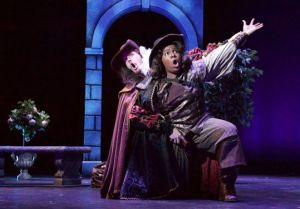
The opera’s important character pairing is the dynamic relationship between Giovanni and his servant, Leporello—the serious Giovanni versus the comic bass role of Leporello. Hetherington’s Giovanni was paired with Brandon Bell, while Winkler was paired with James Eder. Comedy is hard, as the saying goes, yet both Bell and Eder sold their roles with gusto. Having seen Eder before portray only serious characters (Sarastro in The Magic Flute and the evil police agent in The Consul), I was delighted with his comic ability and laugh-out-loud facial contortions. For both singers, their “Catalog Aria” was excellent.
The role of Donna Anna was sung by sopranos Lindsey Fuson and Noelle Harb. Both Fuson (previously heard in The Consul as Magda Sorel) and Harb (previously a dynamic Papagena in last season’s The Magic Flute) are excellent singer-actresses, obviously capable of great range and insight, both dramatically and vocally.
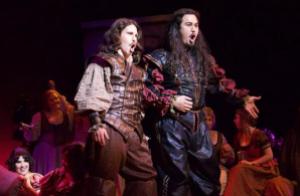
Engaged to Donna Anna is Don Ottavio, a tenor role sung by D.C. Miles, Michael Gonzalez, and Breyon Ewing. (I did not get to see Ewing in the performances I attended.) Miles and Gonzalez, because of the difference in their physical stature and vocal tone, offered different takes on the character. Miles’ Ottavio was imposing and dramatic, while Gonzalez’s was more gentle and introspective. Both were dramatically effective.
The role of Donna Elvira, a noblewoman and previous seductee of Giovanni who is following him hoping either for vengeance or reconciliation, was taken by Alexandria Shiner and Allison Deady. To give Elvira’s serious nature a comic contrast, director Marvel gave her a servant that followed her obediently about the stage, a parasol held above her head. Nevertheless, Shiner and Deady gave their arias “Ah! chi di dice mai” and “Ah, fuggi il traditor” the depth and angst the character suggests.
Adding a lot of dramatic interest to both casts was the peasant couple of Zerlina (Kacie Kenton and Maxwell Porterfield) and Masetto (Harrison Cooke and Tyler Padgett), engaged to be married but nevertheless set upon and challenged by Giovanni. Both pairings had impressive vocal strength and added a different layer of romantic interest to the mix.
With a simple set of arches and an upstage door backed by a cyc, Marvel and lighting designer Kristen Geisler wisely chose to differentiate the scenes and reflect their dramatic tone and locale through color. I must admit that the scene of Don Giovanni’s demise in which he is to be dragged to the fires of hell by the Stone Statue of the Commendatore left me a little cold. In this case, Giovanni is pushed into a casket-like prop by hellish creatures, where he subsequently drops out of sight. Altogether somewhat anticlimactic, but the point was made.
Conductor Kevin Class led the UT Opera Orchestra.
(Photographs by Ryan Colbert)


